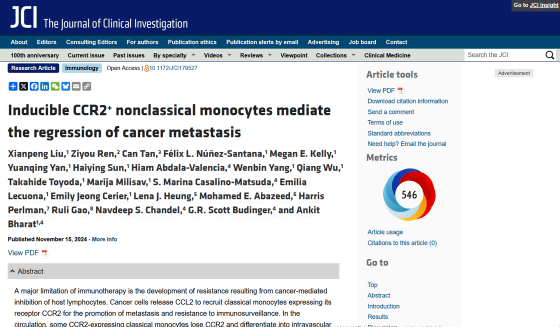Research shows that severe COVID-19 infections can shrink cancer tumors, which could lead to the development of new cancer treatments

A paper published by a research team at
JCI - Inducible CCR2+ nonclassical monocytes mediate the regression of cancer metastasis
https://www.jci.org/articles/view/179527

COVID caused cancer tumors to shrink in mice – new study
https://theconversation.com/covid-caused-cancer-tumours-to-shrink-in-mice-new-study-243973
Cancer treatment methods include surgery to directly remove tumors, chemotherapy to suppress the proliferation of cancer cells and kill them, radiation therapy to damage the genes of cancer cells, and cancer immunotherapy to activate the immune system to attack cancer cells. Cancer immunotherapy has been attracting attention in recent years, and various research results have been accumulated .
However, cancer immunotherapy is effective in only about 20-40% of cases, and is not effective for all patients. Existing cancer immunotherapy mainly targets immune cells called T cells , and cancer immunotherapy often fails when the body cannot produce T cells with sufficient function, so dependence on T cells is thought to be a factor limiting the effectiveness of cancer immunotherapy.
On the other hand, it is known that in people who have contracted a viral infection such as COVID-19 or who have been vaccinated with a certain vaccine, the immune system is activated and becomes resistant to other infections and diseases. This is called trained immunity , and it has the potential to lead to new approaches to treating various diseases.
A research team at Northwestern University conducted animal experiments on mice to see whether the trained immunity generated by severe COVID-19 would be effective in treating cancer. In the experiment, mice with stage 4
Monocytes are a type of immune cell that play an important role in the defense against infection. However, when they invade cancer tumors, they become ' tumor-associated macrophages (TAMs) ' and promote the proliferation, invasion, and metastasis of cancer cells while suppressing the function of T cells.
In this experiment, it was found that the special monocytes produced by severe COVID-19, unlike normal monocytes that are converted into TAMs, retain their cancer-fighting properties. It was confirmed that the special monocytes migrate to tumors and activate natural killer cells to promote the attack of cancer cells. It was reported that in mice that were induced to produce special monocytes, tumors began to shrink in all four types of cancer.
'This mechanism is particularly exciting because it offers a new approach to fighting cancer without relying on T cells, which are the focus of many current immunotherapies,' said Justin Stebbing , professor of biomedical sciences at Anglia Ruskin University. 'It could be a new option for patients for whom conventional cancer immunotherapy is ineffective.'

The results of this study are based on experiments in mice, and clinical trials are needed to determine whether a similar effect is seen in humans. In addition, because the COVID-19 vaccine only uses part of the RNA sequence of the COVID-19 virus, it is unlikely that vaccination will have a similar effect.
Still, because the mechanism involving these specialized monocytes is universal to cancer, it is entirely possible that a similar effect could occur in the human body, potentially leading to the development of new drugs and vaccines.
'Many challenges remain before these findings can be translated into treatments for human patients, but this work represents an exciting step forward in our understanding of the complex relationships between viruses, the immune system and cancer,' said Stebbing. 'It offers hope for new treatments and highlights how scientific discoveries can lead to medical breakthroughs in unexpected ways.'
Related Posts:
in Science, Posted by log1h_ik







